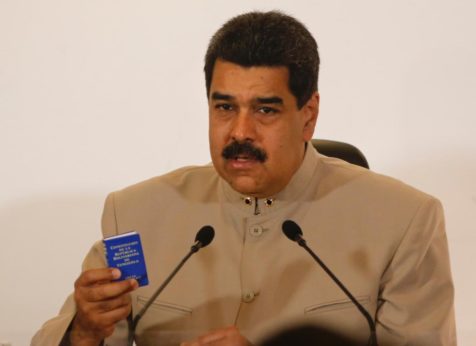
Washington threatened further sanctions against Venezuelan officials yesterday over President Nicolás Maduro’s announced desire to rewrite the country’s constitution.
“What President Maduro is trying to do yet again is change the rules of the game,” said Michael Fitzpatrick, who is Deputy Assistant Secretary of State for Western Hemisphere Affairs.
“The actions that were taken yesterday may well give us new reasons for considering additional individualized sanctions.”
U.S. senators from both parties said that they will introduce legislation providing annual humanitarian assistance of $10 million to Venezuela while toughening sanctions against allegedly corrupt officials.
The Venezuelan government rejects such aid offers as attempts by the U.S. to pave the way for foreign intervention. The senators will also instruct U.S. intelligence agencies to prepare a report on Venezuelan government officials’ supposed involvement in corruption and drug trafficking.
Maduro’s plan for new constitution
Maduro announced the creation of a new “constituent assembly” on May Day in Caracas tasked with rewriting Venezuela’s constitution. His adversaries have labeled the move a power grab and say it is another attempt to override the authority of the opposition-controlled legislature.

They argue that Maduro’s action is a means of avoiding elections which polls suggest his United Socialist Party (PSUV) would struggle to win.
The constituent assembly would reportedly have the authority to dissolve the existing bodies of public power, such as the legislature, and call new elections on an as-yet undetermined schedule. The proposed assembly is a repeat of a move made by Maduro’s predecessor, Hugo Chávez, in 1999.
According to Maduro, the assembly would not include political party representatives and only around half of its 500 members would be elected. His opponents claim the rest of the seats would probably be filled with pre-selected government supporters.
Speaking at a May Day rally in the capital, Maduro told a pro-government crowd, “I don’t want a civil war,” and said he wants “the sovereign people” to “impose peace, harmony, and a true national dialogue” to end the ongoing turmoil. As he was speaking, opposition protestors were battling police in other areas of the city.
Communists condemn intervention, express concern about Maduro
In an “Open Letter to the People of Venezuela,” the Communist Party (PCV) condemned the campaign of violence being waged in the streets by right-wing protestors as well as foreign intervention in the country’s affairs.
It said that right-wing violence was part of a “destabilizing plan” elaborated in the United States with the goal of maintaining “U.S. hegemony” in Latin America and reversing the progressive advances made in the region over the last several years.
The PCV connected some of the economic hardships currently plaguing Venezuelans to this same campaign, pointing especially to artificial product shortages created by anti-government sectors in the business community.
The party called on military officers, whom the opposition has encouraged to rebel against the government, to resist foreign attempts to undermine the nation’s sovereignty. The letter went on to characterize the current standoff between the government and the opposition as “the sharpening of the class struggle in its political form – the heightening of the struggle for power.”
While they called for unity to defend democracy and independence, the Communists also expressed criticism of the Maduro government and the social elements grouped around it.
Referring to Maduro and his key lieutenants in the government, the Communist Party said that the Venezuelan working class needs “sectors of the petit-bourgeoisie which currently hold hegemonic power in the national executive…to immediately abandon all sectarian and selfish conduct.”
The letter did not list specific actions, but said the behavior of the government only “weakened the Bolivarian process” set in motion by Chávez and “effectively works in favor of the enemies’ plans.”
Reiterating its call for broad unity, the PCV said it has for many years insisted on collective and democratic leadership at the national level, but that the “groupings which have exercised hegemonic control over the government have not paid attention.”
Violence continues
Meanwhile, neither Michael Fitzpatrick at the State Department nor the senators behind the proposed sanctions legislation criticized the right-wing opposition’s ongoing violent street protests that led to a further three deaths on Tuesday evening.
Police used tear gas to disperse gangs who disrupted traffic in the capital by blocking streets with broken concrete, twisted metal, and flaming piles of garbage.
Two people were killed overnight when the bus they were travelling in overturned as it tried to avoid an opposition barricade in Carabobo state. A third person was killed during a looting incident at a shop in the industrial city of Valencia, bringing the total of deaths to 32 over the past month. Hundreds more have been injured.
The government suspended the right to carry guns for 180 days on Tuesday.
This story features material from Morning Star and international wire services.










